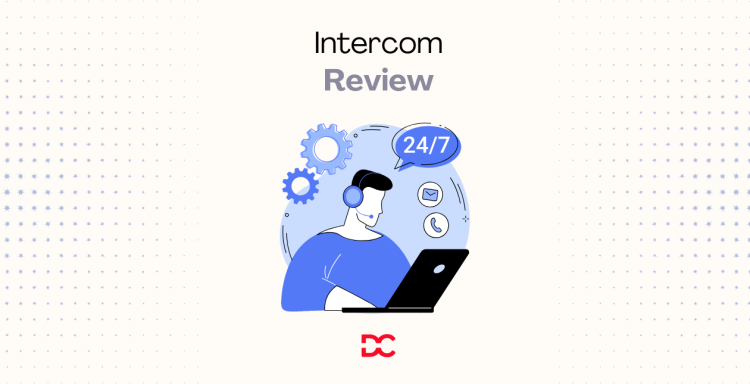Are you tired of juggling separate tools for live chat, email support, and user onboarding? Your team is trying its best, but customer conversations are scattered everywhere. This creates a messy and frustrating experience for your customers, who expect fast and consistent answers.
This isn’t just an internal headache; it directly impacts your bottom line. Research from Zendesk reveals that about 50% of customers will switch to a competitor after just one bad service experience. On the flip side, a separate study shows 89% of consumers are more likely to make another purchase after a positive interaction. When your communication is disjointed, you are not only risking customer churn but also missing out on significant revenue.
This is precisely the problem Intercom, the all-in-one customer communications platform, was built to solve. It brings every conversation—from sales chats and support tickets to proactive product tours—into a single, smart inbox. By using powerful AI and targeted messaging, Intercom empowers your team to provide the fast, personal, and cohesive experience that turns new users into loyal customers.
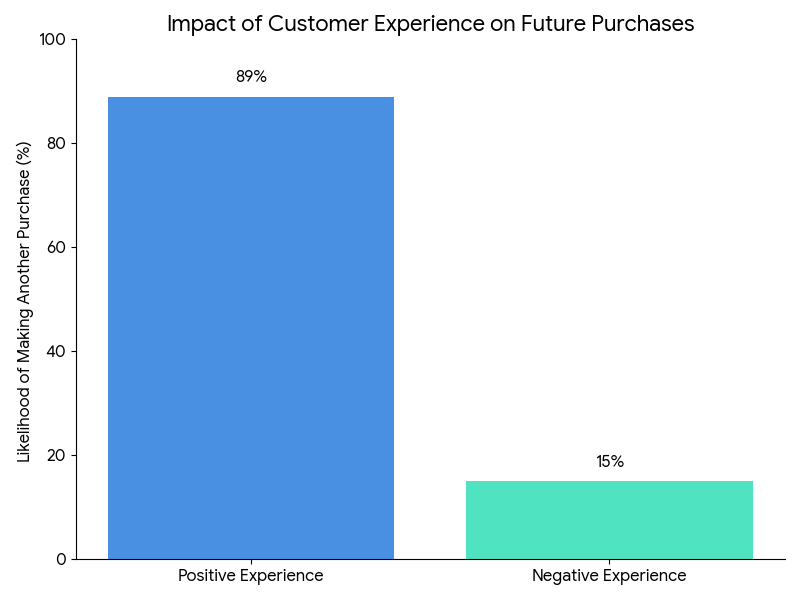
Intercom Overview

Intercom is a leading AI-first customer communication platform, empowering over 25,000 businesses worldwide to build better relationships with their customers through real-time chat, automation, and omnichannel messaging. Launched in 2011 by Eoghan McCabe, Des Traynor, Ciaran Lee, and David Barrett, the company has grown from a simple messaging widget into a robust platform supporting customer support, sales, and marketing functions.
Headquartered in San Francisco, California, Intercom operates globally with major offices in Dublin, London, Chicago, and Sydney, and boasts a workforce of around 1,000 employees. With a strong focus on AI innovation, Intercom recently launched Fin AI Agent, Copilot, and Proactive Support Plus—demonstrating its commitment to delivering smarter, faster, and more personalized support.
Backed by leading venture capital firms like Bessemer Venture Partners and Kleiner Perkins, Intercom is widely recognized as a game-changer in customer engagement. In 2023 alone, the company generated approximately $247 million in revenue and launched its own AI Research Lab, investing $100M+ to shape the future of AI-driven support.
| Product Name | Intercom |
| Official Website | https://intercom.com |
| Developers | Intercom, Inc. |
| Unique Selling Points (USPs) | AI-first support, Fin AI Agent, Omnichannel messaging, Custom Bots |
| Category | Customer Communication & Support Platform |
| Key Integrations | Salesforce, HubSpot, Slack, Jira, Stripe, Zapier, Google Analytics, etc. |
| Best For | Growing businesses, SaaS companies, Enterprise support & engagement |
| Support Options | Live Chat, Help Center, Email, Community, Priority Support (higher plans) |
| Documentation | Developer docs, help articles, onboarding guides |
| Company Headquarters | San Francisco, California, USA |
| Number of Employees | ~1,000 |
| Starting Price | $29/month per seat (Essential Plan – annual billing) |
| Alternatives | Zendesk, Freshdesk, Drift, Help Scout, HubSpot |
| Affiliate Program | ✅ Yes |
| Affiliate Commission | Tiered commission structure (details upon joining) |
| Money-Back Guarantee | ❌ No refunds; 14-day free trial available |
| Add-on Options | Fin AI Agent ($0.99/resolution), Copilot ($35/seat/mo), Proactive Support ($99/mo) |
| Mobile App | Yes (iOS and Android) |
| API Access | Yes (Comprehensive developer-friendly API) |
Intercom is a powerful, scalable, and AI-optimized solution—ideal for businesses aiming to streamline customer communications while reducing support costs and increasing engagement.
Intercom Features
Intercom offers a feature-rich customer communication suite that combines AI-powered automation, real-time chat, ticketing, and omnichannel support—all in one platform. Below are the key features of Intercom explained in detail:
Fin AI Agent
The Fin AI Agent is Intercom’s powerful AI support assistant designed to handle up to 50% of common customer queries without human intervention.
It leverages your help articles and past interactions to provide accurate, instant responses 24/7. It’s priced at $0.99 per resolution, ensuring you pay only for successful answers. Fin can also escalate complex queries to human agents, creating a seamless hybrid support experience.
Copilot (AI for Agents)
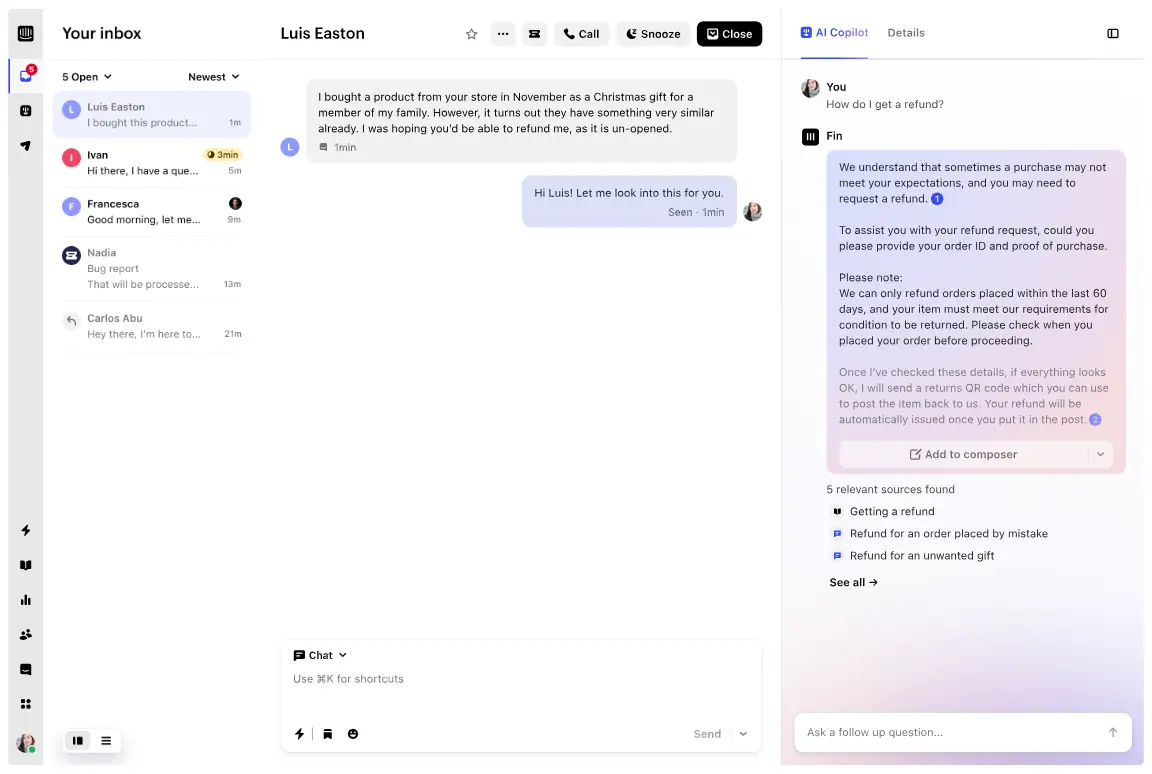
Intercom’s Copilot acts as an AI-powered assistant for support teams. It suggests replies, auto-fills responses, and brings up relevant help content during live chats and emails.
This reduces agent workload and increases resolution speed. Available for $35/seat/month, Copilot helps teams handle more queries with less effort while maintaining quality support.
Shared Inbox & Team Collaboration
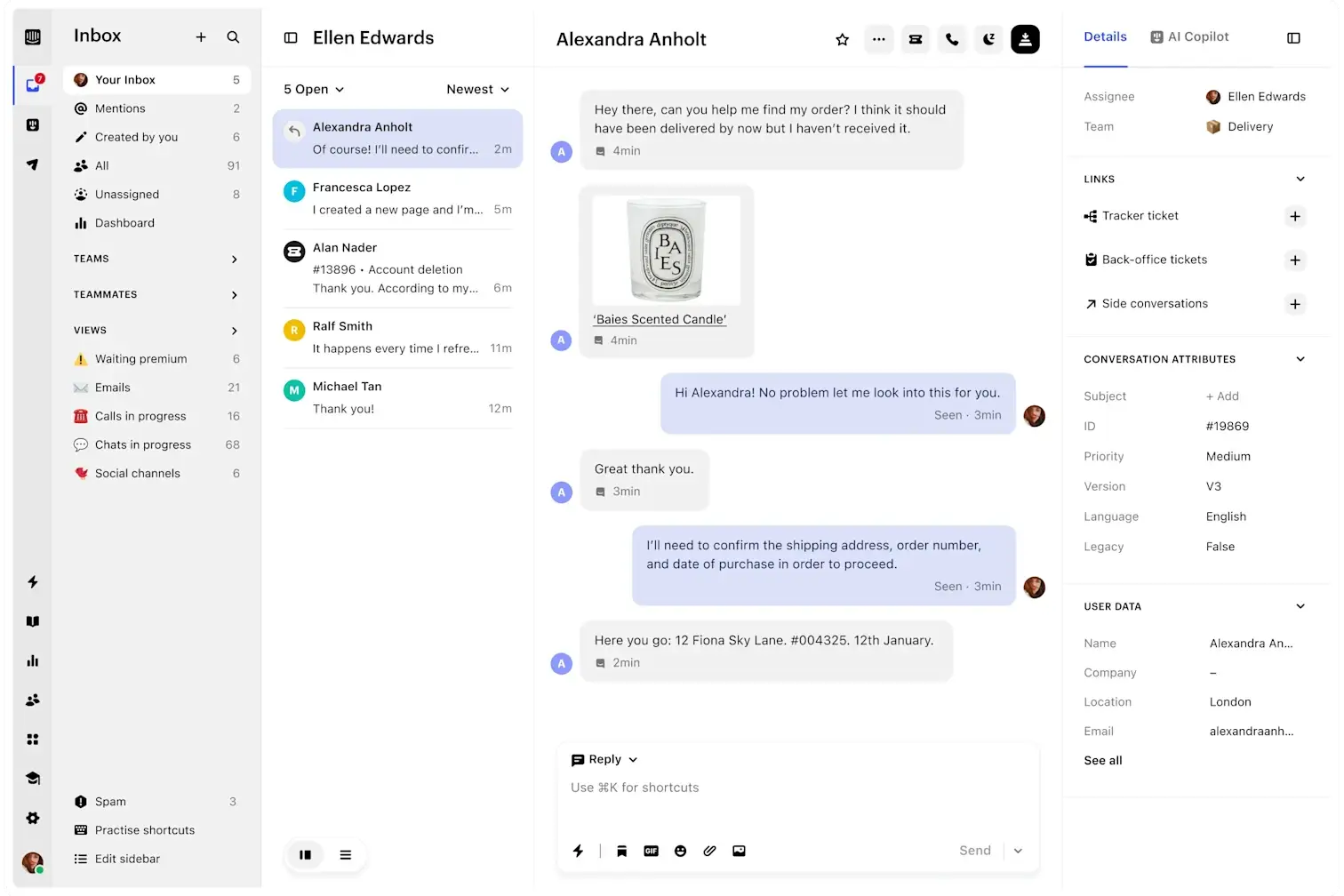
The shared inbox allows teams to manage all conversations across email, live chat, and social channels from a single dashboard.
Agents can assign tickets, leave internal notes, and collaborate in real-time. Features like SLA tracking, CSAT scores, and workload reports ensure optimal team performance and a seamless customer experience.
Custom Chatbots & Workflows
With Intercom, you can build and deploy custom chatbots without any coding knowledge. These bots can qualify leads, provide instant answers, collect user data, and route conversations based on predefined workflows.
Combined with automation, bots help reduce response times and allow agents to focus on high-value interactions.
Help Center & Knowledge Base
Intercom lets you create a branded help center to serve as your customers’ go-to self-service hub. The knowledge base supports multiple languages, is SEO-friendly, and integrates directly with chat to suggest articles in real-time. This reduces repetitive questions and empowers users to solve problems on their own.
Product Tours
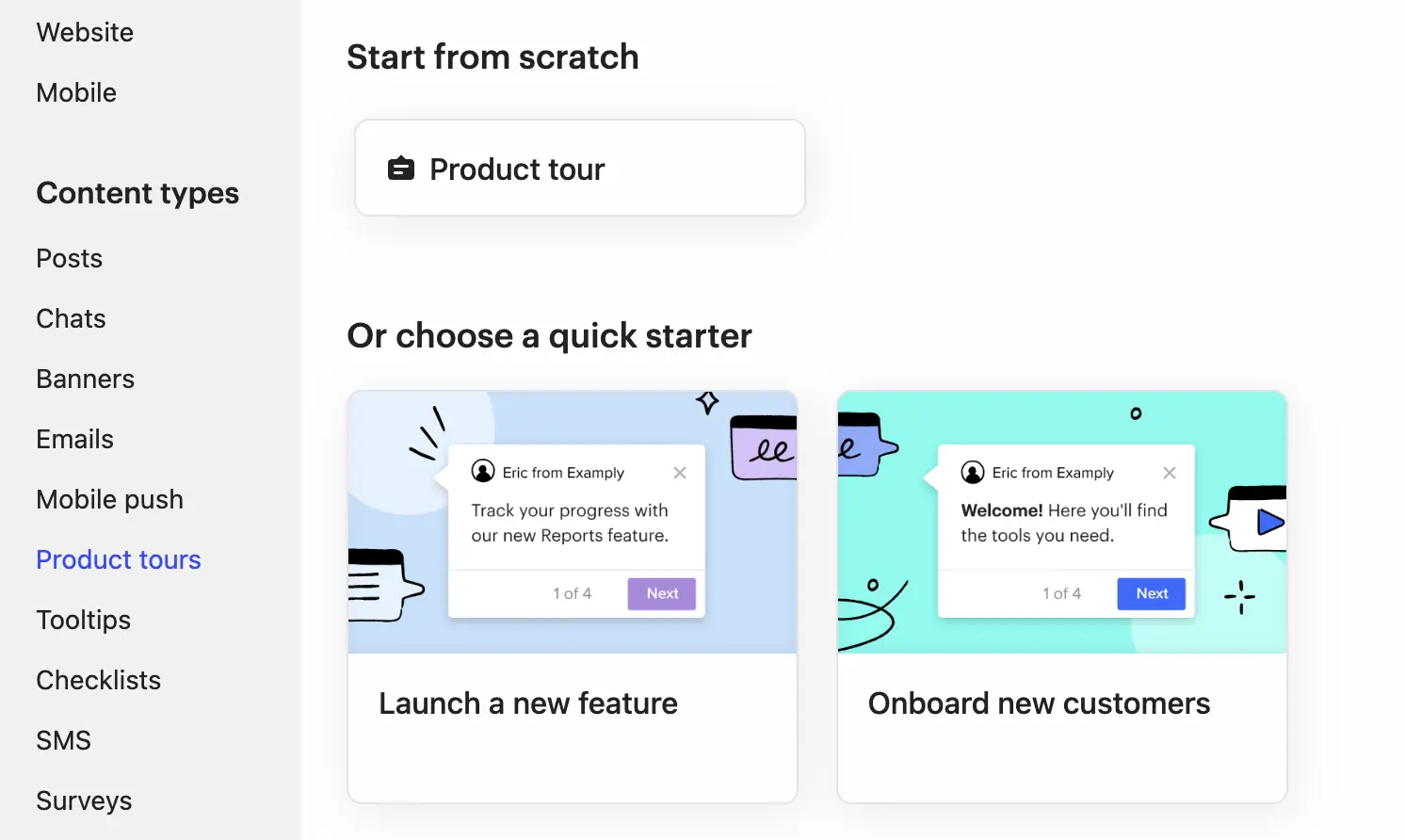
Product Tours help onboard and educate users directly within your app or website. These interactive walkthroughs guide users through features step-by-step, improving adoption and reducing churn.
Tours can be personalized and triggered based on user behavior, making onboarding smarter and more engaging.
Reporting & Analytics
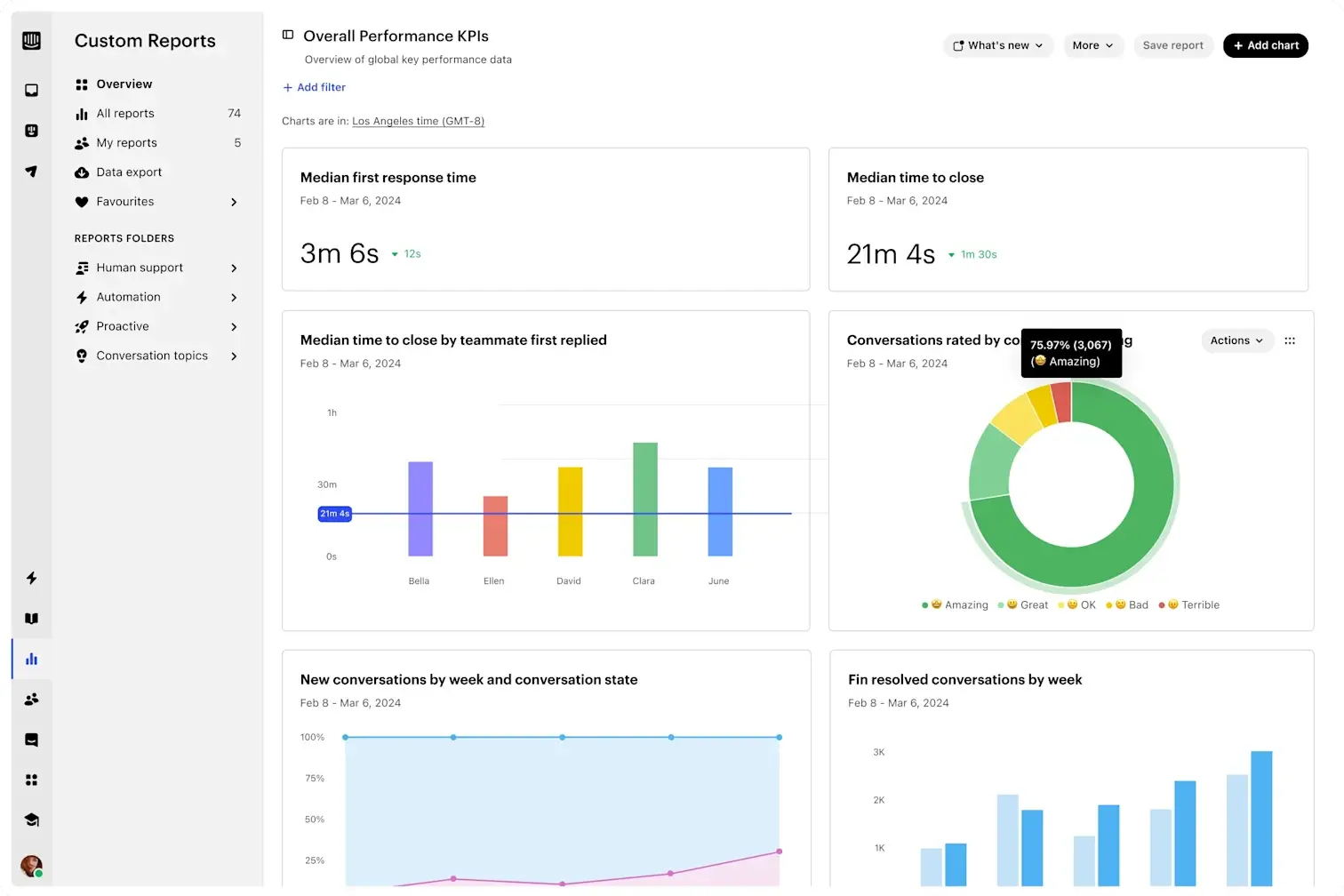
Track and analyze every interaction with Intercom’s built-in analytics. You get insights into conversation volumes, resolution times, team productivity, and customer satisfaction (CSAT).
Visual dashboards and exportable reports help you make informed decisions to improve support efficiency and quality.
Omnichannel Messaging
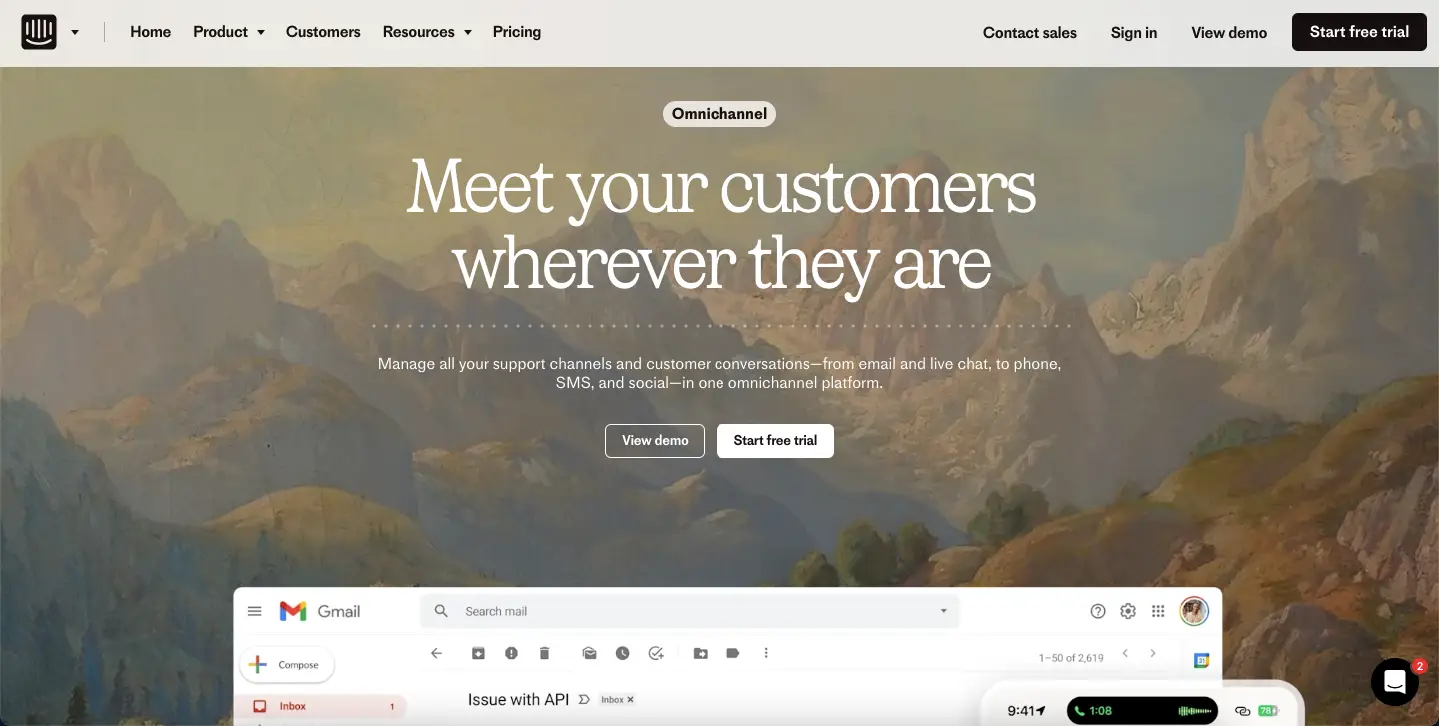
Intercom supports communication across multiple channels including email, in-app chat, mobile push, SMS, and WhatsApp.
All messages are unified into a single conversation view, so you never lose context. This ensures smooth, consistent interactions, regardless of how or where the customer reaches out.
Enterprise-Grade Security
Security and compliance are top priorities for Intercom. With features like Single Sign-On (SSO), two-factor authentication, GDPR, SOC 2, and HIPAA compliance (available in the Expert Plan), you can trust your data is protected. Role-based access and audit logs offer additional enterprise-level control.
450+ Integrations
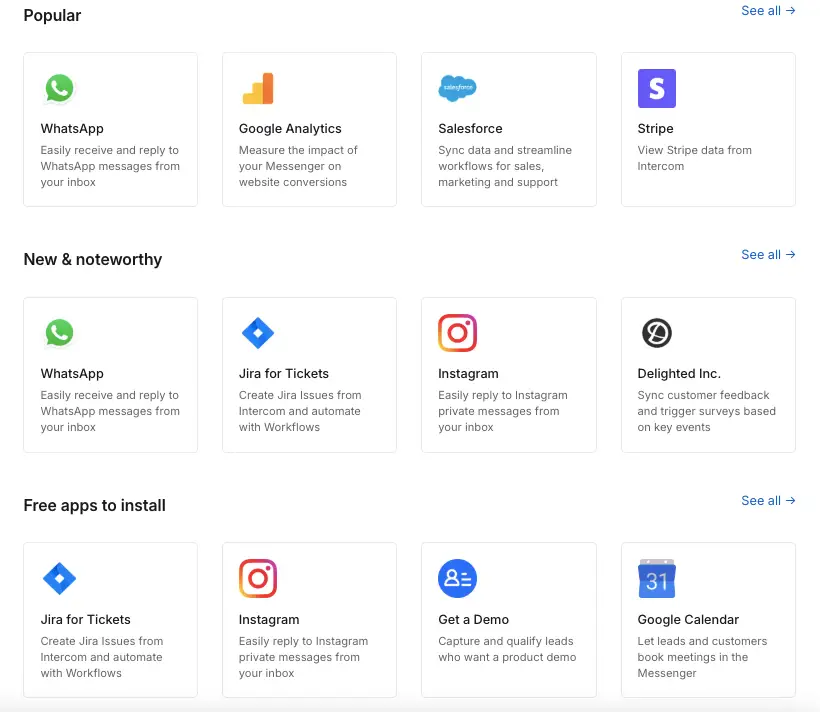
Intercom seamlessly integrates with over 450+ apps and platforms, including Salesforce, HubSpot, Stripe, Jira, Slack, and Zapier.
These integrations streamline your workflow by syncing customer data, automating tasks, and enabling more personalized and efficient support.
Mobile Support (Apps & SDKs)
Intercom offers mobile SDKs for iOS and Android, allowing you to embed live chat directly into your mobile apps.
You can also send targeted push notifications and tailor messaging experiences specifically for mobile users. Plus, agents can respond on the go with Intercom’s dedicated mobile app.
Workflows & Automation
Intercom provides powerful workflow automation that enables you to automatically assign conversations, tag users, route messages, and trigger follow-ups based on customer behavior or ticket status.
These workflows streamline operations and reduce manual tasks, especially when used alongside chatbots and AI tools.
These clearly defined features showcase why Intercom stands out as a leading AI-driven customer messaging and support solution in 2026. Whether you’re scaling your business or optimizing support operations, Intercom’s flexible tools have you covered.
App Store & Integrations
Intercom’s App Store features over 400 integrations, allowing you to connect it seamlessly with the other tools in your tech stack. This ensures data flows smoothly between systems.
Popular integrations include Salesforce, HubSpot, Stripe, Slack, Jira, and Zapier, enabling you to build powerful, automated workflows across your entire business.
How to Use Intercom
Getting started with Intercom is simple and intuitive, whether you’re a startup or an enterprise. The platform is designed to streamline customer support, engagement, and onboarding with minimal setup time. Here’s a step-by-step guide to help you use Intercom efficiently:
Step 1: Sign Up and Set Up Your Account
Go to https://intercom.com and sign up for a 14-day free trial. Once you register, you’ll be asked to add some basic information about your business and your primary goals (support, sales, onboarding, etc.).

No credit card is required for the trial.
Step 2: Install Intercom on Your Website or App
To begin chatting with users, you need to install the Intercom Messenger:
- Web: Add the JavaScript code snippet to your website or use plugins if you’re on platforms like WordPress or Shopify.
- Mobile: Install Intercom’s iOS or Android SDKs to integrate Messenger into your app.
- No-code tools like Webflow and Bubble also support easy integrations.
Step 3: Add Your Team
Invite team members to your Intercom dashboard. Assign them roles such as Support Agent, Admin, or Manager. You can also assign conversations and create teams based on specific workflows.
Step 4: Set Up the Shared Inbox
Configure the shared inbox where all conversations from email, chat, and social channels land. This is where agents collaborate, respond, and manage tickets.
Use inbox rules to route messages to specific teams automatically.
Step 5: Create Bots and Workflows
Use the no-code bot builder to design workflows for automating conversations:
- Route leads to the right sales reps
- Set up Fin AI for automatic support responses
- Trigger help center suggestions or escalation to humans
Add triggers and rules based on user behavior, such as visiting a pricing page or failing to complete signup.
Step 6: Train Fin AI Agent (Optional)
If using Fin AI, connect your help center, past conversations, and FAQs. Fin will use this data to intelligently resolve customer queries.
You can also monitor its accuracy, review performance, and manually improve its answers using Intercom’s training tools.
Step 7: Launch Product Tours & Proactive Messages
Use Product Tours to onboard users step-by-step inside your app or website. Set up targeted messages or popups based on user actions like inactivity, subscription ending, or feature discovery.
Step 8: Monitor Reports & Optimize
Visit the Analytics Dashboard to view KPIs like:
- Conversation volume
- First response time
- Resolution time
- Customer satisfaction (CSAT)
Use insights to optimize agent performance, bot efficiency, and overall workflow.
Step 9: Integrate with Other Tools
Connect Intercom with your tech stack using 450+ native integrations or custom APIs:
- CRMs (HubSpot, Salesforce)
- Billing tools (Stripe, Chargebee)
- Productivity apps (Slack, Notion)
- Marketing platforms (Mailchimp, Marketo)
Step 10: Set Up Security & Permissions
Ensure security by enabling SSO, setting agent permissions, and managing data access. If on the Expert plan, activate HIPAA compliance and custom roles for better control.
Tips:
- Enable mobile push notifications for better engagement
- Use A/B testing on product tours and messaging
- Monitor Fin AI usage to control support costs
- Use tags and segments to personalize user journeys
With this setup, you’re ready to use Intercom like a pro. Whether you’re automating support, qualifying leads, or onboarding users—Intercom offers the tools to do it all with efficiency, intelligence, and scale.
Intercom Alternatives
While Intercom is a leading platform in customer communication, it may not be ideal for every business—especially if you’re seeking more affordable pricing, simpler features, or specialized capabilities. Fortunately, several Intercom alternatives offer powerful features in support, sales, and customer engagement, often at a lower cost or with a different focus.
Here’s a comparison table of some of the best Intercom competitors in 2026 to help you make an informed decision based on your specific needs and budget:
| Tool Name | Best For | Key Features | Starting Price | Free Plan | AI Features | Website |
|---|---|---|---|---|---|---|
| Zendesk | Enterprise-grade support teams | Ticketing, multichannel support, live chat, help center | $55/agent/month | ❌ | AI ticket routing | zendesk.com |
| Freshdesk | SMBs and startups | Ticketing, automation, knowledge base, live chat | $15/agent/month | ✅ | Freddy AI | freshdesk.com |
| Help Scout | Simplicity & affordability | Shared inbox, docs, live chat, customer profiles | $20/user/month | ❌ | AI Assist (Beta) | helpscout.com |
| Drift | B2B SaaS and sales-focused teams | Conversational marketing, lead gen, sales playbooks | Custom Pricing | ❌ | AI chatbots | drift.com |
| HubSpot | All-in-one CRM & marketing teams | CRM, live chat, email automation, knowledge base | $50/month (Service Hub) | ✅ | ChatSpot AI | hubspot.com |
| LiveChat | Real-time website chat | Live chat, canned responses, integrations | $20/seat/month | ❌ | ChatBot add-on | livechat.com |
Quick Recommendations:
- Choose Freshdesk for a budget-friendly support platform with great automation.
- Opt for Help Scout if you want a lightweight, clean interface with human-first support.
- Go with Zendesk for enterprise-level support and deep ticketing infrastructure.
- Use HubSpot if you’re looking for CRM + support + marketing automation under one roof.
- Pick Drift for conversational lead generation and sales enablement.
Each alternative brings something unique to the table. Your decision should be based on your company size, industry focus, budget, and required features like AI automation, integration capabilities, and support scalability.
Intercom Pricing
Intercom’s pricing in 2026 is designed to offer flexibility for businesses of all sizes—from startups to large enterprises. The pricing model includes core plans, AI-powered add-ons, and Lite seat options that help teams scale without overspending.
Here’s a detailed breakdown of Intercom’s current pricing based on annual billing and real-time data from Intercom’s official pricing page:
Intercom Pricing Plans (Annual Billing)

| Plan Name | Price per Full Seat/Month | Lite Seats Included | Key Features |
|---|---|---|---|
| Essential | $29 | 0 | Inbox, Intercom Messenger, help center, basic reporting |
| Advanced | $85 | 20 | Automated workflows, multilingual support, advanced inbox rules |
| Expert | $132 | 50 | SLA rules, HIPAA compliance, SSO, advanced reporting & analytics |
AI-Powered Add-Ons
| Add-On | Price | Description |
|---|---|---|
| Fin AI Agent | $0.99 per resolution | GPT-powered bot to handle support queries; 50-resolution minimum per month |
| Copilot | $35/seat/month | AI assistant for agents to suggest replies and save time |
| Proactive Support Plus | $99/month | 500 proactive support messages/month; additional messages billed separately |
Free Trial
- 14-day free trial available
- No credit card required
- Full feature access included during trial
Which Plan Is Best for You?
- Small Teams & Startups: Go for the Essential plan to get started with core messaging tools at low cost. You can add Fin AI as needed to reduce manual work affordably.
- Growing Businesses & Scaling Teams: Choose the Advanced plan to unlock automation, multilingual support, and manage a growing customer base with up to 20 Lite seats included.
- Enterprises & Regulated Industries: Opt for the Expert plan for full control, compliance (HIPAA, SSO), and deep analytics. It includes 50 Lite seats, making it ideal for large support teams.
With flexible seat options and modular add-ons, Intercom pricing can scale with your business needs. It’s designed to be cost-effective for teams that leverage automation and AI to reduce manual support efforts and increase agent productivity.
Intercom Use Cases
Intercom is more than just a live chat tool—it’s a complete customer communication platform built to serve multiple business functions. Whether you’re a SaaS company, eCommerce brand, or enterprise service provider, Intercom offers flexible tools to improve customer experience, drive engagement, and scale support operations. Here are some of the top real-world use cases where Intercom excels:
1. Customer Support Automation
Intercom helps support teams automate common queries using its AI-powered Fin Agent, reducing resolution times and support costs. Agents can focus on complex issues while bots handle FAQs, returns, password resets, and more.
2. Live Chat & Real-Time Messaging
Businesses use Intercom’s Messenger widget on websites and apps to instantly connect with customers. Real-time chat boosts conversions, resolves doubts quickly, and increases customer satisfaction during critical decision-making moments.
3. User Onboarding & Product Tours
SaaS and product-led companies leverage Product Tours to walk new users through key features. These interactive, in-app tutorials improve user adoption, reduce churn, and shorten time-to-value for new customers.
4. Sales Lead Qualification
Sales teams use custom chatbots to qualify website visitors automatically, ask pre-set questions, and assign hot leads to the right reps. This allows faster follow-up and a more efficient sales funnel without human bottlenecks.
5. Targeted Customer Engagement
Intercom supports proactive messaging to re-engage inactive users, announce new features, or offer promotions based on customer behavior. This use case is powerful for increasing retention and driving feature adoption.
6. Mobile App Support
Intercom’s SDK allows businesses to embed chat into mobile apps, enabling on-the-go customer service and push messaging. It’s ideal for app-first companies looking to support and guide users directly within their mobile experience.
7. Customer Feedback & CSAT Collection
Use Intercom’s in-conversation surveys and CSAT tools to collect customer feedback in real-time. This helps improve service quality and gives product teams valuable insight into user pain points and preferences.
8. Multi-Brand or Multi-Team Support
Intercom allows businesses to manage multiple teams or brands from one dashboard. It supports different inboxes, routing rules, and help centers—ideal for agencies, franchises, or large organizations.
9. Compliance-Driven Customer Communications
For companies in regulated industries, Intercom’s HIPAA-compliant Expert Plan makes it suitable for healthcare or financial services. It ensures secure messaging with SSO, audit trails, and custom permission control.
10. Multilingual Customer Support
Global businesses use Intercom to support customers in different languages. You can create multilingual help center articles, customize chatbot conversations, and route chats to regional teams—all in their native language.
These diverse use cases make Intercom a powerful choice for any business aiming to enhance their customer journey, reduce friction, and grow faster through better communication.
Intercom User Reviews
What Users Love
- Personalized engagement & automation “Intercom is different because it combines live chat, bots, and help desks…making it great for personalized customer support.”
Many users appreciate its ability to unify chat, help center, email, and automation in one platform for smoother customer interactions. - User-friendly interface
Multiple verified reviews emphasize how intuitive the UI is: “Extremely easy to use…you don’t need a deep tech background to figure things out.” - Strong customer support & training
According to SelectHub, 94% of users find onboarding and support materials helpful, while 74% rate Intercom’s own support highly .
Common Complaints
- High and complex pricing
Cost is a repeated concern: “Intercom sucks…for their pricing, the whole experience is very unsatisfactory.”
“My billing shot up by 120%…not able to see significant productivity improvement.” - Limited mobile & integration capabilities
Some users feel mobile SDKs and certain integrations lag behind expectations: “Their node and mobile SDKs are very limited…if you’re looking to use mobile integrations…I would probably look elsewhere.” - Feature overload and learning curve
While powerful, Intercom’s depth can overwhelm smaller teams: “The range of features can be overwhelming…it can represent a steeper learning curve.” - Reporting limitations
Some users report that built-in analytics lack precision: “Internal reports are limited and inaccurate.”
User Satisfaction Snapshot
- Overall rating: 4.5/5 based on ~3,861 reviews
- Satisfaction: 89% of users say they’d recommend Intercom
Intercom excels at providing a user-friendly, all-in-one solution for messaging, automation, and self-service. Across diverse industries—especially SaaS and mid-market businesses—it drives engagement and improves support quality. However, its pricing model, potential feature complexity, and occasional integration or reporting gaps may deter smaller teams or those with simpler needs.
For businesses seeking smart automation and are prepared to grow into Intercom’s full capabilities, it’s often worth the investment. But startups or mobile-first applications might want to explore lighter or more cost-effective alternatives.
What Makes Intercom Stand Out?
Intercom truly stands head and shoulders above its competitors by treating customer communication as a single, continuous conversation, not a series of isolated tickets. Where other platforms often provide siloed tools for support, sales, and marketing, Intercom excels by unifying them into one elegant solution. This holistic approach ensures every team member has the full customer context.
The platform shines with its powerful combination of proactive engagement and advanced AI. You can automatically guide new users with Product Tours and then have Fin, its powerful AI agent, instantly resolve their questions by referencing your knowledge base. This blend of preventing issues proactively while resolving others automatically in a single, intuitive dashboard is what sets a new standard in the industry, making Intercom a complete customer relationship engine.
FAQs
What is Intercom used for?
Intercom is an AI-powered customer communication platform used by businesses to manage support, sales, and engagement through live chat, email, and automated messaging. It helps teams streamline customer service, automate responses with bots, and deliver personalized experiences at scale.
Does Intercom offer a free trial?
Yes, Intercom offers a 14-day free trial with full access to all core features, including the Messenger, inbox, bots, and analytics. No credit card is required to start the trial, making it risk-free for new users.
Is Intercom suitable for small businesses?
Intercom is a great option for small businesses, especially with the Essential plan that starts at $29 per seat per month. It offers core features like messaging, help center, and reporting, making it ideal for startups looking to grow their support and onboarding systems.
What are the key features of Intercom?
Key features of Intercom include the Fin AI Agent for automated support, Copilot for agent assistance, shared inbox, custom chatbots, product tours, omnichannel messaging, reporting, and a customizable help center. These tools work together to enhance customer experiences across platforms.
How does Intercom’s Fin AI Agent work?
Fin AI Agent is a GPT-powered chatbot that handles customer queries automatically by pulling information from your help center and previous interactions. It resolves issues in real time and costs $0.99 per resolution, reducing the workload for human agents.
What is the pricing structure of Intercom?
Intercom’s pricing includes three main plans: Essential ($29/seat/mo), Advanced ($85/seat/mo), and Expert ($132/seat/mo), with varying levels of features and Lite seat access. Additional charges apply for AI-powered tools like Fin AI and Copilot, billed separately based on usage.
Does Intercom offer a money-back guarantee?
Intercom does not offer a money-back guarantee. However, the 14-day free trial allows you to test the platform thoroughly before committing to a paid subscription, helping users make an informed decision.
Can Intercom be integrated with other tools?
Yes, Intercom supports over 450 integrations, including Salesforce, HubSpot, Slack, Stripe, Jira, Google Analytics, and Zapier. These integrations allow users to sync data, automate workflows, and connect Intercom with their existing tech stack easily.
Conclusion
Intercom stands out in 2026 as a premium, AI-driven platform for businesses that want to unify their customer communications. Its strength lies in its ability to combine support, marketing, and sales interactions into a single, cohesive conversation powered by one of the most capable AI bots on the market. While the investment is significant, the return for the right company—particularly in SaaS and e-commerce—is clear. The ability to proactively support users, automate common queries, and engage customers at the right moment can lead to higher satisfaction, better retention, and increased revenue.
To create this review, we conducted a thorough analysis of Intercom’s features, tested its user interface, and scrutinized its 2026 pricing structure. We also compared it directly against its main alternatives to provide a balanced and comprehensive perspective. For businesses ready to invest in a superior customer experience, Intercom remains a top-tier choice.
The Review
Intercom
Intercom is cutting-edge customer service software that transforms how companies assist their clients. The platform uses robust messaging and automation to link companies with customers directly. It provides teams the ability to grow assistance without using more resources, which makes customers happier and support teams more effectively.
PROS
- AI-Powered Support
- Unified Messaging Platform
- Excellent Onboarding Tools
- Mobile SDK Support
- Advanced Reporting & Analytics
- 450+ Integrations Available
- Multilingual Help Center
- Scalable with Lite Seats
- Enterprise-Grade Security
CONS
- No Money-Back Guarantee
- Slow Customer Support (at times)
- Limited Analytics Customization
- Complex for Small Teams

